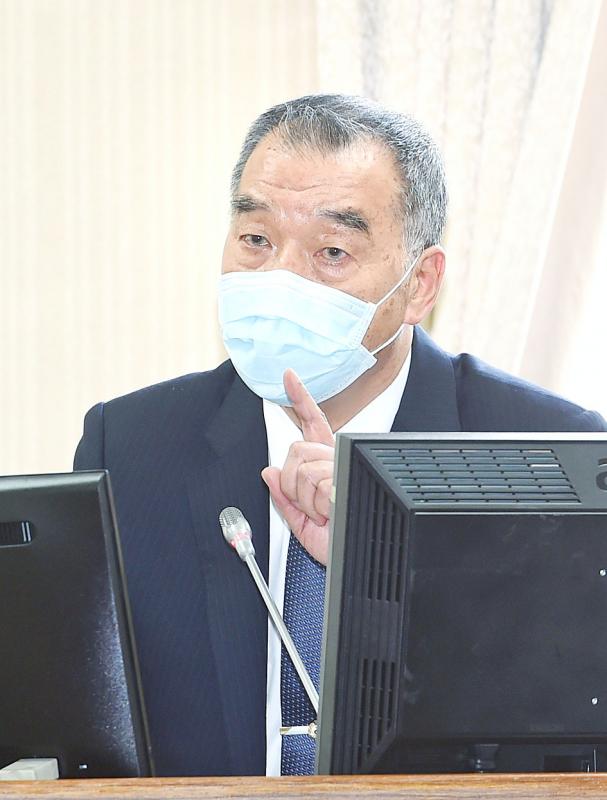A proposal to purchase 12 MH-60R anti-submarine military helicopters from the US is likely to be canceled due to the high cost of the aircraft, Minister of National Defense Chiu Kuo-cheng (邱國正) told lawmakers yesterday.
The navy was set to allocate NT$34 billion (US$1.15 billion) for the helicopters to replace its aging fleet.
However, a local defense expert in late February told local media that the US Department of State had rejected the proposal on the grounds that it “does not conform to the principle of asymmetric combat power.”

Photo: Fang Pin-chao, Taipei Times
Asked about the issue, Chiu told a meeting of the legislature’s Foreign Affairs and National Defense Committee that the Ministry of National Defense was close to dropping the purchase, but the reason was not due to US pressure, but because the cost was “too high and beyond our capability.”
Chiu added that the military had been pushing the US to honor a contract to deliver 250 Raytheon Technologies Stinger missiles to Taiwan on schedule, after his ministry was told that delivery might be delayed due to Ukrainian demands for weapons needed to fight the Russian invasion.
He said that the ministry would make sure that the US follows the terms stipulated in the contract to deliver the missiles on time.
The ministry has contingency plans in place to ensure that its overall plan to boost the nation’s combat readiness is not jeopardized due to the delay, he said, adding that the ministry is to finalize the plans before September.
The US approved the sale of 250 Raytheon Technologies Stinger missiles to Taiwan in 2019. Local media have reported that the deliveries are expected by 2026.
This is the second time this week that the military has said that deliveries of US-made weapons could be delayed.
The ministry on Monday said that the US had notified it that the M109-A6 “Paladin” self-propelled howitzers would not be delivered on schedule due to inadequate production capacity.
Taiwan’s military was originally set to take delivery of the first eight Paladins next year before receiving 16 each in 2024 and 2025.
However, Washington told the ministry that it would not be able to deliver the first batch of Paladins to Taiwan until 2026 at the earliest due to inadequate production capability.
Instead, Washington proposed alternative long-range precision strike weapon systems such as High Mobility Artillery Rocket Systems, which have a strike distance of 300km when carrying M57 Army Tactical Missile Systems.
In other news, US Joint Chiefs of Staff Chairman General Mark Milley on Tuesday talked about the possibility of Beijing attacking Taiwan by 2027.
It remains to be seen whether China could build up the necessary capability, but “we must remember” its goal regardless, the Chinese-language Voice of America quoted Milley as saying during a US Senate Appropriations Subcommittee on Defense hearing.
“We are entering a less stable world” where the possibility of serious conflict between major powers is increasing, he said.
Chinese President Xi Jinping (習近平) has been clear about his goal of preparing the People’s Liberation Army to invade Taiwan, but this does not mean that he is going to invade — only that he has the ability to do so, Milley added.

Taiwan is gearing up to celebrate the New Year at events across the country, headlined by the annual countdown and Taipei 101 fireworks display at midnight. Many of the events are to be livesteamed online. See below for lineups and links: Taipei Taipei’s New Year’s Party 2026 is to begin at 7pm and run until 1am, with the theme “Sailing to the Future.” South Korean girl group KARA is headlining the concert at Taipei City Hall Plaza, with additional performances by Amber An (安心亞), Nick Chou (周湯豪), hip-hop trio Nine One One (玖壹壹), Bii (畢書盡), girl group Genblue (幻藍小熊) and more. The festivities are to

Auckland rang in 2026 with a downtown fireworks display launched from New Zealand’s tallest structure, Sky Tower, making it the first major city to greet the new year at a celebration dampened by rain, while crowds in Taipei braved the elements to watch Taipei 101’s display. South Pacific countries are the first to bid farewell to 2025. Clocks struck midnight in Auckland, with a population of 1.7 million, 18 hours before the famous ball was to drop in New York’s Times Square. The five-minute display involved 3,500 fireworks launched from the 240m Sky Tower. Smaller community events were canceled across New Zealand’s

‘IRRESPONSIBLE’: Beijing’s constant disruption of the ‘status quo’ in the Taiwan Strait has damaged peace, stability and security in the Indo-Pacific region, MOFA said The Presidential Office yesterday condemned China’s launch of another military drill around Taiwan, saying such actions are a “unilateral provocation” that destabilizes regional peace and stability. China should immediately stop the irresponsible and provocative actions, Presidential Office spokeswoman Karen Kuo (郭雅慧) said, after the Chinese People’s Liberation Army (PLA) yesterday announced the start of a new round of joint exercises around Taiwan by the army, navy and air force, which it said were approaching “from different directions.” Code-named “Justice Mission 2025,” the exercises would be conducted in the Taiwan Strait and in areas north, southwest, southeast and east of Taiwan

UNDER WAY: The contract for advanced sensor systems would be fulfilled in Florida, and is expected to be completed by June 2031, the Pentagon said Lockheed Martin has been given a contract involving foreign military sales to Taiwan to meet what Washington calls “an urgent operational need” of Taiwan’s air force, the Pentagon said on Wednesday. The contract has a ceiling value of US$328.5 million, with US$157.3 million in foreign military sales funds obligated at the time of award, the Pentagon said in a statement. “This contract provides for the procurement and delivery of 55 Infrared Search and Track Legion Enhanced Sensor Pods, processors, pod containers and processor containers required to meet the urgent operational need of the Taiwan air force,” it said. The contract’s work would be